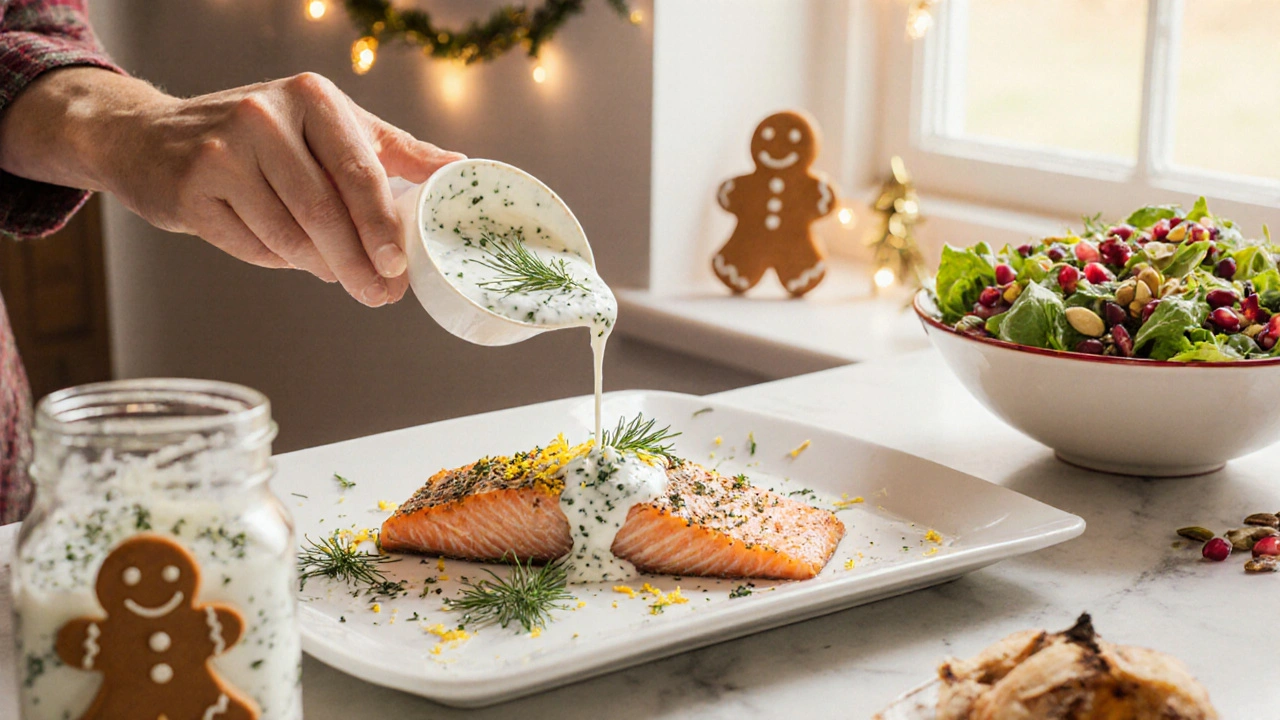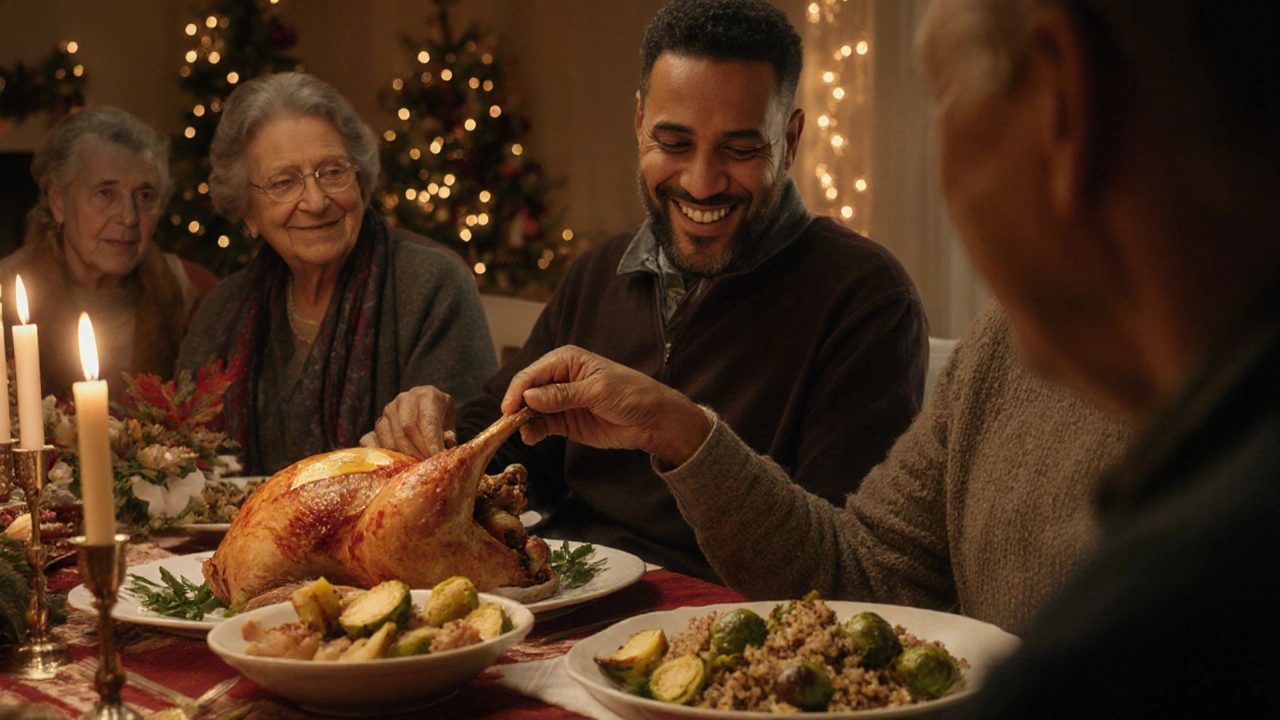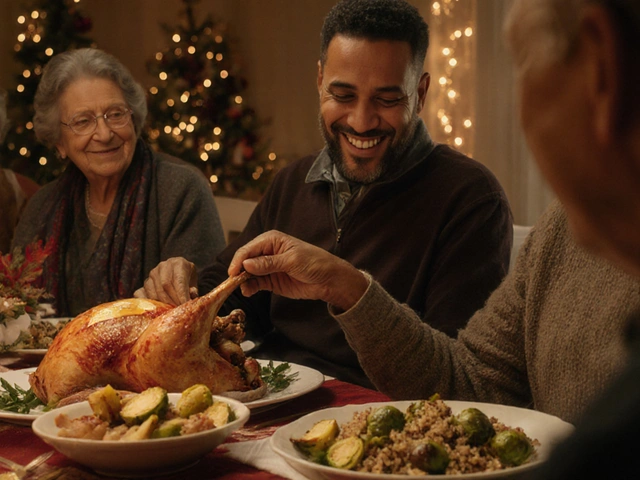Did you know that roughly one in three diners experience uncomfortable Bloating is a distended feeling in the abdomen caused by excess gas or fluid buildup after the holiday feast? The festive season piles on rich roasts, sugary desserts, and endless glasses of wine, turning a joyous gathering into a painful swelling that can ruin the night.
TL;DR - Quick Wins for Holiday Bloating
- Start meals with a glass of water and a short walk.
- Choose low‑FODMAP sides like carrots, pumpkin, and quinoa.
- Sip peppermint or ginger tea after eating.
- Take a digestive enzyme or simethicone if you feel gassy.
- Limit carbonated drinks and alcohol to one serving per hour.
Why Does Bloating Spike During The Holidays?
The holiday menu is a perfect storm for digestive distress. Here’s how the usual suspects work together:
- Gas is a mixture of nitrogen, oxygen, carbon dioxide, hydrogen, and methane produced during digestion. Overeating or eating quickly lets more air in, raising gas levels.
- Fermentation is the breakdown of undigested carbs by gut bacteria, releasing gas as a by‑product. High‑FODMAP foods like onions, garlic, and beans are prime fermentation fuel.
- Fiber provides bulk and feeds beneficial gut microbes, but excess soluble fiber can increase gas. Holiday salads drenched in dressing can tip the balance.
- Alcohol relaxes the lower esophageal sphincter and slows stomach emptying, leading to bloating. A glass of wine or a festive cocktail can double the swelling.
- Carbonated drinks introduce extra carbon dioxide gas directly into the stomach. Sparkling cider may be tasty, but it’s a quick bloating trigger.
- Stress activates the “fight‑or‑flight” response, altering gut motility and encouraging gas buildup. Holiday planning pressure can make your gut uneasy.
Instant Relief Tactics (What to Do Tonight)
- Take a 10‑minute walk. Light movement stimulates the intestines and helps gas pass.
- Drink warm water with a pinch of baking soda (½ tsp per glass). It neutralises stomach acid and eases pressure.
- Sip a cup of peppermint or ginger tea. Both herbs soothe smooth muscle and reduce bloating.
- If you’re comfortable with over‑the‑counter options, try simethicone (e.g., Gas-X). It coalesces gas bubbles, making them easier to expel.
- Chew a digestive enzyme tablet containing lipase and amylase. It speeds up fat and carbohydrate breakdown, cutting down fermentation.
Smart Food Choices for Future Feastings
Adjusting the menu can prevent the next round of discomfort without sacrificing flavor.
| High‑FODMAP (Trigger) | Low‑FODMAP (Swap) |
|---|---|
| Garlic‑infused mashed potatoes | Mashed potatoes with chives or asafoetida powder |
| Cranberry sauce with added apple | Cranberry sauce sweetened with maple syrup |
| Brussels sprouts sautéed with onions | Roasted carrots and parsnips with thyme |
| Stuffing with wheat bread and sausage | Gluten‑free quinoa stuffing with herbs |
| Wine‑glazed pears | Fresh orange segments with a drizzle of cinnamon |
Incorporating Probiotics are live microbes that help balance gut flora and can reduce gas formation. Yogurt with live cultures, kefir, or a daily probiotic capsule (containing strains like Bifidobacterium lactis) are easy additions.
Adopting a Low FODMAP diet limits fermentable carbohydrates that cause gas, helping many people control bloating for a few weeks before the big holiday can reset your gut.

Planning The Perfect Holiday Plate
- Portion control: Aim for ½ plate veggies, ¼ protein, ¼ carbs. Smaller portions reduce stomach stretch.
- Slow down: Put down utensils between bites. Chewing thoroughly cuts air intake.
- Hydrate smartly: Sip water throughout the meal instead of gulping soda.
- Choose cooking methods: Roast or steam instead of deep‑frying. Less fat means faster digestion.
- Season wisely: Use herbs (parsley, rosemary) for flavor without adding onion or garlic powders.
Year‑Round Lifestyle Tweaks
Holiday habits don’t have to be the only cause of uncomfortable swelling. These daily practices keep your gut happy all year:
- Schedule a 20‑minute walk after dinner at least three times a week.
- Keep a food‑and‑symptom journal. Spot patterns early before they become chronic.
- Practice stress‑relief techniques: deep breathing, short meditation, or a quick yoga flow.
- Limit artificial sweeteners (sorbitol, xylitol) that can ferment in the gut.
- Get enough sleep; poor rest disrupts gut motility.
When to Seek Professional Help
Most holiday bloating passes within a day, but watch for these red flags:
- Severe pain that awakens you at night.
- Unintended weight loss or changes in bowel habits.
- Persistent swelling lasting more than two weeks.
- Accompanying symptoms like vomiting, fever, or blood in stool.
If any of these appear, schedule a visit with a gastroenterologist. They may run tests for IBS, SIBO, or food intolerances and prescribe targeted treatments.
Frequently Asked Questions
Can I drink sparkling wine without bloating?
A small glass is usually fine, but the carbonation adds extra gas. If you’re prone to bloating, choose still wine or limit sparkling drinks to one per party.
Are over‑the‑counter enzyme pills safe for everyone?
Most healthy adults tolerate them well. People with pancreatitis, severe allergies, or on certain medications should check with a doctor first.
How long does a low‑FODMAP trial need to be before I see results?
Typically 2-4 weeks. Most notice reduced gas and swelling within the first week if FODMAPs were the main trigger.
Is peppermint tea safe for everyone?
It’s generally safe, but people with gastroesophageal reflux disease (GERD) may find it worsens heartburn. A short trial can tell you.
What’s the best time to take a probiotic?
Most experts recommend taking it on an empty stomach, about 30 minutes before breakfast, to maximize survival through stomach acid.








Oliver Bishop
September 28, 2025 AT 07:06Keep the carbs low and the turkey high, folks!
Alissa DeRouchie
October 8, 2025 AT 16:42Wow the whole holiday feast feels like a battlefield when the belly starts swelling it’s a drum roll of doom the decorations can’t save you from the gas attack the family laughs turn into groans and everyone pretends it’s fine but the truth is we are all suffering in silence
Emma Howard
October 19, 2025 AT 02:18Start your holiday dinner with a glass of still water and a few minutes of light stretching to wake up the gut.
Chew each bite slowly, aiming for at least 20–30 chews per mouthful, because the more you mash food, the less air you swallow.
Swap out the garlic‑infused mashed potatoes for a chive‑seasoned version; the flavor stays, the FODMAP load drops.
Add a handful of peeled carrots or roasted parsnips as a side – they’re low‑FODMAP and keep the plate colorful.
Sip peppermint tea after you finish eating; the menthol relaxes smooth muscle and can shave minutes off bloating time.
If you feel a bubble brewing, a ten‑minute walk around the house or backyard lets gravity and movement push gas along.
A pinch of baking soda in warm water works like a quick antacid, neutralising excess acid that can trap gas.
Consider a low‑dose simethicone tablet; it doesn’t hurt anyone and can make the uncomfortable pressure fade faster.
For those who love the sweet finish, replace heavy cranberry sauce with a drizzle of pure maple syrup over fresh orange segments.
Keep your wine glass half‑full and alternate sips with water – this cuts down carbonation and alcohol‑induced relaxation of the sphincter.
Limit any fizzy drinks; even the festive sparkling cider adds carbon directly to your stomach.
Record what you ate and how you felt in a simple notebook; patterns emerge fast and you can tweak the menu for next year.
If you’re prone to stress, try a quick three‑minute breathing exercise before the first course – calm nerves mean calmer guts.
A probiotic capsule taken on an empty stomach in the morning can boost good bacteria that out‑compete gas‑producing critters.
Remember, portion control is king: aim for half the plate veggies, a quarter protein, a quarter carbs, and you’ll avoid over‑distension.
Finally, enjoy the company and laughter; a happy gut is often a less bloated gut!
dee gillette
October 30, 2025 AT 11:54While the vivid portrayal captures the emotional turmoil of holiday indigestion, the underlying physiology is more systematic; excess gas originates from rapid ingestion and fermentable substrates rather than mere dramatic flair.
Jasin P.
November 10, 2025 AT 22:30Oh brilliant, the secret to conquering bloating is apparently just moving the turkey higher on the plate – because we all know the vertical position of poultry directly influences intestinal pressure, right?
Lily Đàn bà
November 22, 2025 AT 09:06Honestly, those exhaustive tips read like a lecture from a diet guru who’s never actually faced a holiday table; the drama of “ten‑minute walks” and “peppermint miracles” feels over‑the‑top and nobody has time for a seminar between the turkey slices.
Joseph O'Sullivan
December 3, 2025 AT 19:42Ever thought that our festive feasts are a microcosm of life’s larger paradox – we gather to celebrate abundance, yet the very excess we cherish turns our bodies against us, whispering that moderation is the true celebration?
Johanna Sinisalo
December 15, 2025 AT 06:18That philosophical take highlights an important mindset shift; integrating mindful portions and balanced choices can turn the holiday into a harmonious experience rather than a battle of bloat.
OKORIE JOSEPH
December 26, 2025 AT 16:54Enough sarcasm – just take a probiotic and stop whining.
Lucy Pittendreigh
January 7, 2026 AT 03:30It’s disgraceful how we glorify overeating during the holidays, ignoring the real cost to our health and the environment when we waste food and strain our bodies.
Nikita Warner
January 18, 2026 AT 14:06While the moral perspective raises valid concerns, practical steps such as planning modest portions, incorporating nutrient‑dense sides, and allowing time for digestion can address both health and ethical considerations without sacrificing festivity.